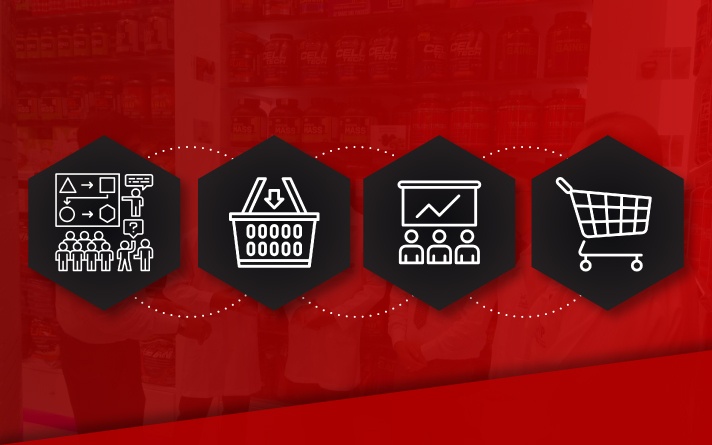
There is no doubt about the fact that the retail industry is hard. In fact, it can be brutal. Considering that, as a supplier, you’d want to equip your key account managers with the best retail training available. That’s especially true if you want to ensure they can provide value to retailers and buyers where needed.
Why should suppliers provide retail training to their account managers?
If you want to provide a specific product or service, one of the first things you’d need to do is understand your customer. You’d need to understand who they are and what they want.
In the context of this piece, the customer is the retail buyer while your key account managers are those responsible for planning and managing the full relationship between your business and these buyers - this includes sales. That much should be obvious. However, that doesn’t mean that retail training is a given, or even adequate. We’ve heard of plenty of stories where suppliers have trained up their employees incorrectly.
In those cases, what ends up happening is everyone suffers, including the customer.
So why should you provide your account managers with quality retail training? While the above does indicate why, there is still room for clarity. In short, the question still needs to be answered.
To answer it fully, we need to look at the role of your average buyer in retail.
In simple terms, a retail buyer is a person who decides on what goods are bought from manufacturers or suppliers to be sold in a retail store. Their primary responsibility is thus to obtain the highest quality goods at the best cost.
That means that in most, if not all, cases, your average retail buyer is someone who knows how to drive a hard bargain. By the way, that’s not a negative thing. After all, they’re responsible for meeting the needs of the retailer, finding the appropriate suppliers, and negotiating a good price.
Knowing that, if you want your account managers to offer advice and do so successfully, you need to train them to be able to manage and deal with retail buyers. For example, your account managers need to know what goal a buyer has when entering negotiations. They need to be able to offer the appropriate advice to help a buyer save money but not lose out on quality.
More than that, you’d need to ensure your account managers can work well under high stress, have good communications skills, and are adept at building long-lasting relationships. They also need to understand how to hold their own with logic and data-driven debates.
When should suppliers provide retail training?
Now that you know why you should offer training to your account managers, the next question revolves around time. In short, when should you provide it?
The answer to this question can take different forms depending on the route you want to take. For example, you may want to provide training to account managers once they’ve reached a certain experience level and not before, or you may want to focus your training resources on those who are new to the role.
As a side note, retail training should be conducted by a third party or an in-house training specialist. Of course, you can supplement this training by setting up your key account managers to mentor anyone new to the role. However, you must be careful that this mentoring doesn’t become the only form of training.
It could work if you have multiple senior account managers who, once trained up, can then take juniors under their wing and teach them what they know.
That said, if you were to ask us when you should begin training up your account managers, it’s simple: you should start from the day they join your company. And it should be ongoing.
Let us explain:
As we’ve said before, working in retail is tough and even more so for Account Managers who have to work with buyers who are notorious for their negotiation skills. Given these factors, it's only reasonable to suggest that investing in your Account Managers by offering retail training makes good business sense.
Also, if the consequences are so significant for all parties, why would you want to wait for an account manager to gain enough experience before you begin training them? Also, why would you want to restrict them, providing them with training only once requested?
Given the pace at which the retail industry changes, training should be ongoing and consistently reviewed. After all, in going this route, you can ensure that your account managers are always up to date and able to provide value.
How can suppliers equip their account managers with retail training?
1. Provide your account managers with a solid foundation in retail
While an account manager has a specific role to fulfil and they do need specialised training, it’s just as crucial that you start them off with a solid foundation in retail. The reasons for that are obvious. Just like for any other industry, to be truly useful, you need to know how the world of retail and all that is in it, works.
A basic foundation in retail could include, among other aspects, the following:
- Understand the different types of retailers;
- The 4Ps of Marketing and their effect on retail;
- How to manage stock carefully within a retailer; and
- Basic Merchandising principles
Let’s look at the example of how to manage stock properly. An account manager would need to understand that if a retailer takes on extra stock, it will eat into their cash flow. It also restricts the retailer on various fronts, including the fact that they can’t buy other stock. Once money has been invested in a brand, its positioning is vital to ensure its movement.
Meanwhile, your account managers would need to ensure the shelves are enticing to the customer and the price offered to the retailer is at a price that encourages the customer to purchase the product.
If an account manager provides this support from a visual and pricing perspective, the products will sell, and the retailer is more likely to see a positive return on their investment. That results in a stronger retailer-supplier relationship.
On the other hand, an account manager should also know how to work with data as well as understand the product listing and ordering processes of retailers.
2. Match the retail training course to the specific needs of the account
As much as understanding all things retail can get you far, your account managers also need specialised, in-depth training. After all, if they are to service the account correctly, they need to be given the best opportunity to do so.
That said, when choosing the right training course, the account manager does need to have worked on the account first. By doing that, they can then determine the gaps that must be filled.
As for determining the steps you must to match the right course to the needs of the account, you can do this by asking yourself a series of questions. All of these questions revolve around the role that you’ve chosen as a supplier.
Enrol in DotActiv Academy and learn all about the space planning and merchandising aspects of retail
Here are a few questions:
- What is your business objective?
- What do you want to achieve?
- Do you want to become a category captain?
- Do you want to increase brand visibility?
- Do you want to offer data analytics?
- Do you want to provide in-store support?
In short, the retail course would depend on the demands of your supply business. Once you’ve answered these questions in full, you can go about finding a programme that will meet your needs.
For example, if you want to become a category captain for the category, you would enrol your account manager in a course that covers this topic in detail. Likewise, if you’re looking to offer data analytics, you’d focus on a data specific retail course that teaches you everything you need to know.
3. Upskill your account managers with new skills and refresher training
It’s always worth providing retail training to your new account managers as we have pointed out above. After all, they need help getting set up. However, you shouldn’t forget about those of your account managers who are already established and have years of experience.
In fact, it could be argued that it’s that much more vital to retrain them. That’s especially true given the pace of change within the retail industry.
For example, while an experienced account manager may already have outstanding communication skills and thus know how to communicate effectively with retailers, you may have recently introduced a new system or process. Thus, the way you communicate has changed, which means you’d need to provide your experienced account managers with refresher training.
On that point, even if your current account managers are already well-versed in the updated system or process, that doesn’t mean that they’re exempt. While refreshers reiterate what is supposed to be already known, a refresher can also drive the point home. Also, when upskilling your account managers, you need to be proactive rather than reactive. That way, you can anticipate any bumps or barriers before they even happen.
More importantly, it will set you apart from other suppliers who work with the retailer.


